HORACE:
Study Greek models night and day.
Whatever advice you give, be brief, so that the teachable mind can take in your words quickly and retain them faithfully.
Whatever you invent for pleasure, let it be near to truth. We don’t want a play to ask credence for anything. The elder citizens chase things off the stage if there’s no substance in them, and the high-spirited youngsters won’t vote for dry poetry. Combine pleasure with usefulness.
There are some mistakes we forgive. The string doesn’t always give the note that the hand and the mind intended: it often returns a high note when you ask for a low. The bow won’t always hit what it threatens to hit. But when most features of a poem are brilliant, I shan’t be offended by a few blemishes thrown around by carelessness or human negligence. But what then? If a copyist goes on making the same mistake however much he is warned, he is not forgiven; if a lyre-player always gets the same note wrong, people laugh at him. I’m even angry when Homer nods, though a doze is OK in a long work.
Poetry is like painting. Some attracts you more if you stand near, some if you’re further off.
POPE:
Horace still charms with graceful Negligence,
And without Method talks us into Sense,
Will like a Friend familiarly convey
The truest Notions in the easiest way.
Tis not enough your Counsel still be true,
Blunt Truths more Mischief than nice Falsehoods do;
Men must be taught as if you taught them not;
And Things unknown propos’d as Things forgot:
Without Good Breeding, Truth is disapprov’d;
That only makes Superior Sense belov’d.
Some positive persisting Fops we know,
Who if once wrong, will needs be always so;
But you, with Pleasure own your Errors past,
And make each Day a Critic on the last.
Whoever thinks a faultless Piece to see,
Thinks what ne’er was, nor is, nor e’er shall be.
In every Work regard the Writer’s End,
Since none can compass more than they Intend.
Music resembles Poetry; in each
Are nameless Graces which no Methods teach,
And which a Master-Hand alone can reach.
Pope (b. 1688) was keenly aware of Psychology before it became a ubiquitous and pedantic school subject in the early 20th century: “Blunt Truths more Mischief than nice Falsehoods do; Men must be Taught as if you Taught them Not” is Psychology in a nutshell. Nothing more needs to be understood, for coming at Psychology directly always fails; if great authors teach anything, it is that all Wisdom is profoundly indirect. And yet intention is all—as flexible as Pope is, you will be held to that.
Alexander Pope also earns points by praising Horace, his opponent.
Team Pope really wants to win this thing.
We moderns like to flatter ourselves that we are more easy-going and flexible than our predecessors, but it depends on who one reads; Pope and Horace are not rigid pedants: stand back from this poem/painting, you’ll like it better; don’t hanker after perfection; there are some beauties no method can reach—Pope learned from Horace’s nonchalant wit. And yet the easy-going can have high standards, too, and intimidating terms Genius, Master, and God in Pope’s context serve, with gentleness and suavity, beauties which continue to please.
WINNER: POPE

